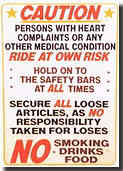Thursday, December 06, 2007
Mitt Romney is no John Kennedy
Mitt Romney:
By "religion," Romney means religion in Euro-American nations, particularly as it is practiced in the United States. All the old major world religions grew & flourished under political conditions & regimes we consider extremely oppressive; tyrants, kings, emperors & empires. Christianity began as a small cult meeting in private homes & hoping the Roman government wouldn't take notice. Early Christians didn't attract much attention until they refused to offer obligatory annual homage to the god-emperor, a rather empty ritual for most residents of the Roman Empire, just another method Romans used for collecting goodies & financing the upkeep of a local temple outpost. Christians wouldn't take the oath of loyalty to the emperor as a god, although they insisted this refusal wasn't an indication of disloyalty to the emperor as a political entity. They simply wanted the same "bye" Rome gave monotheistic Jews, who also wouldn't take the oath. Eventually, & after much suffering, Christians became a powerful political force, found a friend in Emperor Constantine, & the rest is, like they say, history. Free to be Christians, with influence at the highest levels of government, but it wasn't freedom. Under our Constitution, America could exist as a nation comprised entirely of atheists, whether or not one believes it would be a good thing. That couldn't happen in many countries, where if religion is not running the government upfront or behind the scenes, there is at least a remanent structure of an official state-religion.
"Freedom and religion endure together, or perish alone." This strangely echoes Lincoln, perhaps the most spiritual person ever to occupy the Oval Office. But Lincoln belonged to no organized religion. His over-riding concern in the decades leading to his election, & afterward, was that freedom, not religion, would perish if the United States broke into a collection of warring, petty states, the nightmare of Europe transported to the North American continent, a fear shared by Washington, Franklin, Jefferson, Madison, Adams, etc. The founders of the United States differed sharply on the role & strength of religion in gluing the states together. Most of them were suspicious of organized religion interfering with government. The contentious differences between the Christian churches already rooted in America were worrisome to them.
The poisonous & the liberating qualities of religion struggle with each other regardless of political system. The ultimate goal of most religion is the eternal union of the individual soul or spirit with the Divine, which happens occasionally on Earth but is more likely to occur when one has abandoned one's corporeal guise. In some traditions, martyrdom increases the odds of success. In other traditions, formal obedience trumps content, so oppressive law or forced conversion are sufficient to the purpose. Problems arise when religion demands that all human behavior & institutions act in accordance with a specific concept of Divine Perfection. In this regard, I find nearly all religions frightening. Mormonism disturbs me because it dismisses abstractions & metaphors, it lacks poetry. Mormons tell us exactly what happens in Heaven, leaving little to mystery or to the imagination. Heavenly buildings have the Mormon architecture of Salt Lake City, heavenly families look like the Osmonds on a picnic in a peaceful mountain meadow. Yet, I would gladly vote for Mitt if I agreed with his political views & attitudes. But I don't.
"If a nation expects to be ignorant and free, in a state of civilization, it expects what never was and never will be." Thomas Jefferson
"Almost 50 years ago another candidate from Massachusetts explained that he was an American running for President, not a Catholic running for President. Like him, I am an American running for President."Sure enough. Except John Kennedy gave his famous speech two months before the 1960 general election in an attempt to allay the irrational fears of some conservative protestant, mostly southern white voters, at that time inclined to vote straight ticket Democratic, that he wasn't an agent of the Vatican Antichrist (in 1960, an enlightened, freedom-loving man named Angelo Giuseppe Roncalli). But those voters soon walked away in droves from the national party over the issue of civil rights, in 1964, never to return. The press knew the truth about Kennedy's personal behavior. Roman Catholics knew Kennedy wasn't a super-Catholic (one reason ordinary Catholics liked him) , & the idea that he'd ever be the Pope's puppet was absurd & offensive to them. Kennedy wanted to reassure some voters that he respected the separation of church & state. That's not the issue in this Repug primary. Many on political right believe the separation clause of the Constitution is a liberal lie & are worried that the Mormon "heresy" will become the representive American religion when they've worked so hard & so long to install a peculiarly bigoted & narrow form of protestantism. Evangelical protestants of different types compete with each other & with teams of Mormon boys in white shirts & ties for converts. Romney says this:
"Freedom requires religion just as religion requires freedom. Freedom opens the windows of the soul so that man can discover his most profound beliefs and commune with God. Freedom and religion endure together, or perish alone."The statement sounds so true yet is so wrong that I hardly know where to begin to pull it apart. Cheese requires crackers just as crackers requires cheese?
By "religion," Romney means religion in Euro-American nations, particularly as it is practiced in the United States. All the old major world religions grew & flourished under political conditions & regimes we consider extremely oppressive; tyrants, kings, emperors & empires. Christianity began as a small cult meeting in private homes & hoping the Roman government wouldn't take notice. Early Christians didn't attract much attention until they refused to offer obligatory annual homage to the god-emperor, a rather empty ritual for most residents of the Roman Empire, just another method Romans used for collecting goodies & financing the upkeep of a local temple outpost. Christians wouldn't take the oath of loyalty to the emperor as a god, although they insisted this refusal wasn't an indication of disloyalty to the emperor as a political entity. They simply wanted the same "bye" Rome gave monotheistic Jews, who also wouldn't take the oath. Eventually, & after much suffering, Christians became a powerful political force, found a friend in Emperor Constantine, & the rest is, like they say, history. Free to be Christians, with influence at the highest levels of government, but it wasn't freedom. Under our Constitution, America could exist as a nation comprised entirely of atheists, whether or not one believes it would be a good thing. That couldn't happen in many countries, where if religion is not running the government upfront or behind the scenes, there is at least a remanent structure of an official state-religion.
"Freedom and religion endure together, or perish alone." This strangely echoes Lincoln, perhaps the most spiritual person ever to occupy the Oval Office. But Lincoln belonged to no organized religion. His over-riding concern in the decades leading to his election, & afterward, was that freedom, not religion, would perish if the United States broke into a collection of warring, petty states, the nightmare of Europe transported to the North American continent, a fear shared by Washington, Franklin, Jefferson, Madison, Adams, etc. The founders of the United States differed sharply on the role & strength of religion in gluing the states together. Most of them were suspicious of organized religion interfering with government. The contentious differences between the Christian churches already rooted in America were worrisome to them.
The poisonous & the liberating qualities of religion struggle with each other regardless of political system. The ultimate goal of most religion is the eternal union of the individual soul or spirit with the Divine, which happens occasionally on Earth but is more likely to occur when one has abandoned one's corporeal guise. In some traditions, martyrdom increases the odds of success. In other traditions, formal obedience trumps content, so oppressive law or forced conversion are sufficient to the purpose. Problems arise when religion demands that all human behavior & institutions act in accordance with a specific concept of Divine Perfection. In this regard, I find nearly all religions frightening. Mormonism disturbs me because it dismisses abstractions & metaphors, it lacks poetry. Mormons tell us exactly what happens in Heaven, leaving little to mystery or to the imagination. Heavenly buildings have the Mormon architecture of Salt Lake City, heavenly families look like the Osmonds on a picnic in a peaceful mountain meadow. Yet, I would gladly vote for Mitt if I agreed with his political views & attitudes. But I don't.
"There is one fundamental question about which I often am asked. What do I believe about Jesus Christ?"Although there is no religious test for holding office, Mitt, like all the other candidates in both parties this year, is compelled to ask himself the question & to provide an answer.
"I believe that Jesus Christ is the Son of God and the Savior of mankind."The direct confession of faith, an absolute requirement for Republican candidates, occurs about one-third of the way into the speech. Mitt knows America is a nation where only believers in Jesus as the Christ are elected president. It's not specified in the Constitution, but it's true. The remainder of Mitt's speech tells us that he believes the United States was established primarily to provide religious freedom for religious people. Both John F. Kennedy & Thomas Jefferson would disagree.
Labels: blogging against theocracy, religion, THE election














